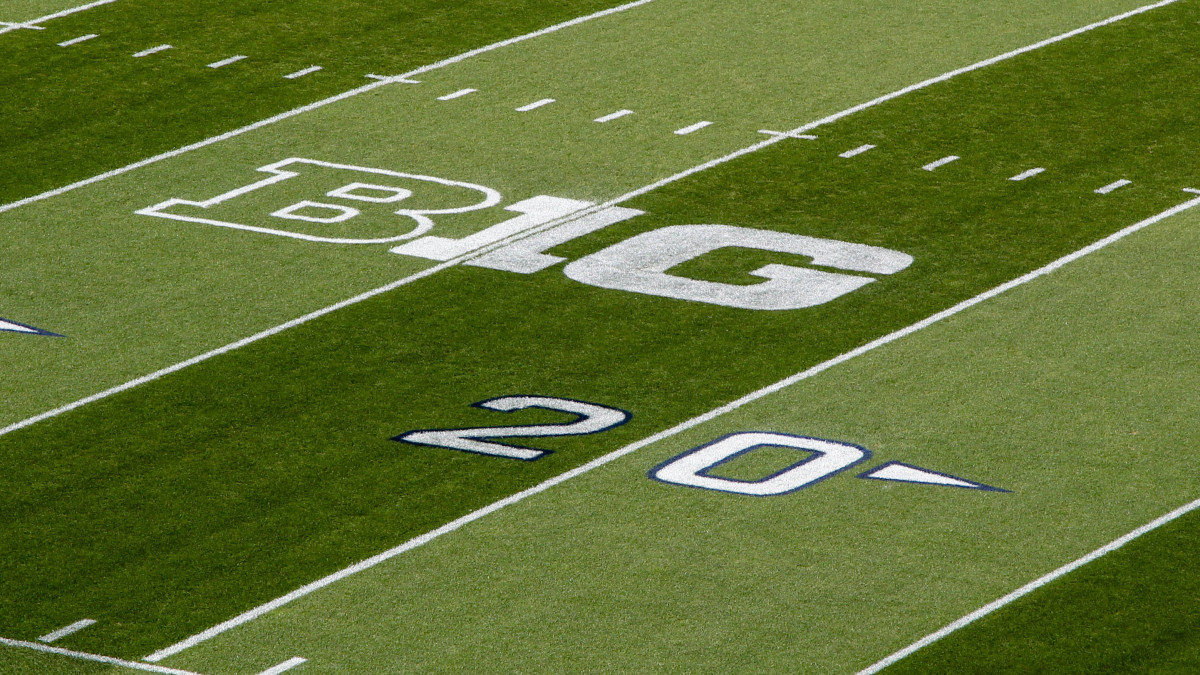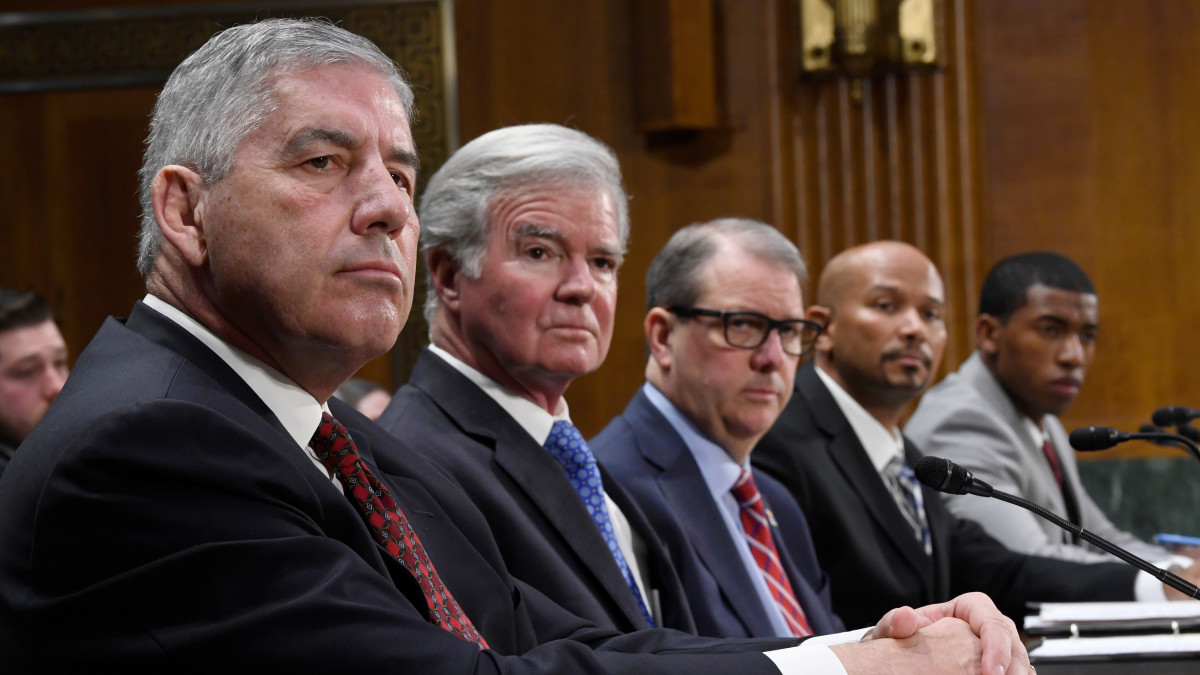Big Ten Football Parents Want Answers After Sudden Shift to Postpone Season
Pablo Fields was driving on the Cobb Parkway in Kennesaw, Ga., Tuesday afternoon when he heard the news: His son Justin’s junior football season at Ohio State was being postponed—at best—by the Big Ten Conference.
“I pulled over,” Pablo Fields said. “It was a really, really bad day, one you’ll never forget.”
What he heard in his son’s voice that day hasn’t left him, either. Justin Fields was a Heisman Trophy finalists last year and will be a first-round NFL draft pick with or without playing another down of college football, but he badly wanted to have a fall season.
“My son is always upbeat and positive, but in our conversation that day he was heartbroken,” Pablo said. “I don’t think he wants to be done being a college football player. We’re not rich by any means, but he’s not in a hurry to get the dollars. He loves Ohio State University and loves his teammates, and he has some unfinished business he’d like to complete.”
Can that business still be completed? It seems unlikely, but many Big Ten parents of football players haven’t yet given up the fight.
You may have seen the letter Iowa parents had hand-delivered to Big Ten Conference offices in Chicago this week. They’re not alone.

Parents of football players from various Big Ten schools want their voices heard. They want answers about why the league pivoted from releasing a schedule Aug. 5 to postponing the entire season Aug. 11. They want details on the findings from the medical advisory board that helped inform the decision to call off fall ball.
And they still want a chance for their sons to play. Even if that means bringing in the lawyers. (Keep reading.)
“I felt like the season was pulled out from under them before they got a chance,” said Amanda Babb, stepmom of Ohio State player Kamryn Babb, and head of the team’s parents association. “They were told by their coaches, ‘We have to follow these safety protocols to have a season,’ and they did. Then it didn’t even matter.”
Babb’s organization drafted its own letter Saturday, also sending it to the Big Ten. Dianne Freiermuth, president of the Penn State parents organization, sent a letter signed by more than 80 parents of Nittany Lions players to the Big Ten later Saturday.
“The decision just came too quick,” said Freiermuth, mother of Nittany Lions tight end Pat Freiermuth. “I totally believe in medical experts and think we should be listening to them—if the right thing to do medically is not to play, I’m fine with that. But to go from releasing the schedule to the start of practice to stopping the season, without explanation, is just wrong.”
From Tim Ford, father of Illinois tight end Luke Ford: “I think the way this was handled was atrocious. As if they didn’t have three-four months to figure something out.”
Maurice Goodson, father of Iowa running back Tyler Goodson, took a more conciliatory tone. But he’d still like to hear more information about what the Big Ten did.
“It’s devastating news, it really is,” Goodson said. “I get it, I really do—we all want our players to be in good health. We just want to know why, what changed, and for the Big Ten to provide those answers to us.”
It is worth noting that the parental disapproval rating of the Big Ten’s action is far from unanimous. Plenty of them aren’t sending letters or emails to the league office.
“I am OK with the Big Ten’s decision,” said Kim Newsome, mother of Nebraska defensive back Quinton Newsome. “I know my child wants to play, for the love of the sport. But at what risk? I love football, too, and I think they should just sit it out for the year.”
Several parents brought up the stress the situation has placed on their sons, and the lack of direction they now feel going forward.
“They’re lost,” Dianne Freiermuth said. “They don’t have answers. From a conference that prides itself on mental health, to do it this way? It leaves a bitter taste.”
Ultimately, this could be headed beyond players and parents voicing discontent and wind up where so many contentious issues do in America—in the land of lawyers. Prominent college sports attorney Tom Mars told SI that “several Big Ten players’ parents asked for help” in trying to find a way to play immediately. In response, Mars drew up a two-page document entitled, “Action Plan to Mitigate Concerns and Legal Risks of Playing Fall 2020 Football.” (Read that document here.)
Mars said he shared the plan with at least two head coaches in the Big Ten, who in turn have passed it to parents of some players. The plan is based on four premises, the most important of which are getting all major stakeholders—players, parents, conference commissioners, university presidents, athletic directors and head coaches—to unite behind a petition to the NCAA to rescind its ban on liability waivers.
You may recall that some schools trotted out various versions of a waiver for their players to sign when they returned to campus in June for summer workouts. Those were met with some considerable backlash, not the least of which came from the United States Senate.
Senators Richard Blumenthal (D-CT) and Cory Booker (D-NJ) introduced legislation June 30 to prohibit COVID-19 waivers that some colleges were requiring their athletes sign in order to work out on campus. When NCAA president Mark Emmert appeared before a Senate Judiciary Panel in July, he was asked about the waivers.

“I am categorically opposed to it,” Emmert said. “It is an inappropriate thing for schools to be doing.” By early August, the NCAA had banned liability waivers.
Mars’s plan suggests a multi-pronged campaign to get that ban overturned. The chances of that might not be great, but if it happens, the next steps would be as follows, from the plan:
“Member institutions retain legal counsel within their state to draft a ‘liability waiver’ that includes terms regarding Covid-19 that plainly and thoroughly explain all known risks of being infected and the known and potential long-term health effects, limits or extinguishes liability for negligence, disavows player’s reliance on statements outside the contract made by the school or its representatives, requires player to knowingly assume risks of infection and consequences thereof, requires mandatory arbitration, confirms player’s decision to seek advice from his own legal counsel or waiver thereof, preserves scholarships and all other benefits provided by the school, and requires that the student-athlete’s (and, if applicable, their parent’s or guardian’s) signature be witnessed by a notary public.
“Member institutions manage the process of offering players the ability to play in Fall 2020 by signing a ‘liability waiver’ while preserving the rights of student-athletes who choose not to execute a waiver.”
At least one Big Ten school has left itself open to second guessing in terms of waiver consistency. Earlier this week, Penn State’s college newspaper reported that incoming students had to sign a “COVID-19 compact” as a condition of fall semester enrollment. "Students were required to read the acknowledgment and accept it, or else forfeit their ability to return or remain on campus,” the Daily Collegian reported.
After receiving considerable blowback, the school announced Thursday that it is amending the compact. “We have heard from some concerned with language requiring students to assume the risks of exposure to COVID-19,” Penn State said in a statement. “Others have misinterpreted the language of the Compact as a waiver of students’ rights, which was neither the case, nor the intent.”
Among the parents who said he would readily sign such a document waiving their school of liability if it let their sons play: Pablo Fields and Tim Ford.
“I think they’re grown men and should be able to choose for themselves,” Fields said. “I was a young man, 22 years old, when I became a police officer. There were risks every day walking the beat, and I chose to take them. It’s certainly OK to right a wrong, and the Big Ten can do that.”
Added Ford: “I would be 100% for the waiver. I think everything we do in life has risks, and in football there are known risks and unknown risks. But to take away a season based on what could happen, endnote even give the kids that did opt in a chance, was wrong. The kids and families had a chance to opt out, so conversely the others opted in.”
Among those who are not a fan of such a waiver liability ban: Blumenthal, the Senator who helped apply pressure to the NCAA to institute the ban in the first place.
"It epitomizes the current system, that the colleges are shifting the risk burden to the athletes and absolving themselves of responsibility,” Blumenthal told SI. “I think this suggestion shows how the system is deeply broken. Coercing athletes to sign away their rights is not only unfair but clearly unwise, because the schools are likely to be less cautious if they believe they bear no legal responsibility. They clearly have a moral responsibility that they’re attempting to shirk. Trust the doctors. I respect and admire the passion of players and coaches and their dedication but the risks are very formidable.
“I can’t believe they’re even thinking about it. It’s wrong."
Additional reporting for this story from Ross Dellenger.
